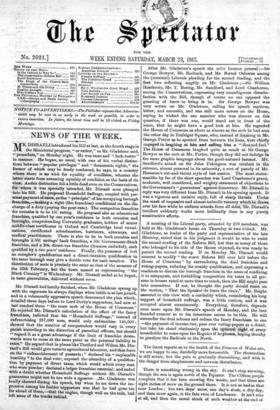After Mr. Gladstone's speech the mêlée became general ;—Sir George
Bowyer, Mr. Roebuck, and Mr. Bernal Osborne among the (nominal) Liberals pleading for the second reading, and the first two reflecting angrily on Mr. Gladstone ;—Sir William Heathcote, Mr. T. Baring, Mr. Sandford, and Lord Cranborne, among the Conservatives, expressing very unambiguous dissatis- faction with the Bill, though of course no one opposed the granting of leave to bring it in. Sir George Bowyer was very severe on Mr. Gladstone, calling his speech captious, bitter, and sarcastic, and was still more severe on the House, saying he wished the one member who was sincere on this question, if there was one, would stand out in front of the mace, that he might have a good look at him. He regarded the House of Commons as about as sincere as the mob he had seen the other day in Trafalgar Square, who, instead of listening to Mr. George Potter as he spouted from between the lions, were chiefly engaged in laughing at him and caning him a "damned fool." The Howse of Commons laughed quite as much at Sir George Bowyer as the mob at Mr. Potter, though they did not indulge ia the same graphic language about the good-natured baronet. Mr. Saudford's attack on Sir John Pakington was virulent in the extreme, almost personal in its animosity, a sort of parody of Mr. Horsmau's cut-and-thrust style of last session. The most states- manlike by far of the short speeches was Lord Cranborne's grave, moderate, well considered, and weighty statement of objections to the Government's "guarantees" against democracy. Mr. Disraeli in reply was very different from Mr. Disraeli in his opening speech. It was a vigorous and incisive reply, full of sharp thrusts. Under the mask of impassive and almost imbecile vacancy which he draws over his face while he endures attacks from all sides, Mr. Disraeli's intellect evidently works more brilliantly than in any purely constructive efforts.






























